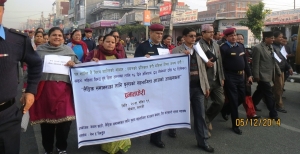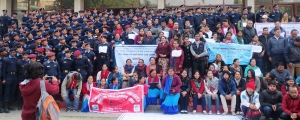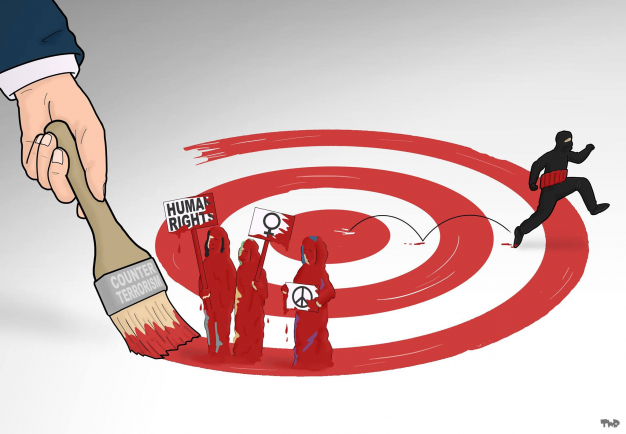Column by Kapil Kafle, Executive Director IHRICON and Coordinator of MenEngage Alliance Nepal
On the occasion of the 16 Days of Activism Against Gender-Based Violence Campaign, the MenEngage Alliance Nepal (MEAN), a coalition of more than 60 organizations and individuals, organized a series of processions and knowledge-exchanges in close cooperation with the Nepal Police. In this column, Kapil Kafle, Coordinator of MEAN, and active member of the WPP Asia Network, gives an insight in the preparations of the processions and highlights the importance of partnership between NGO's and the police, resulting in multiple commitments made to eliminate gender-based violence.
From November 25 to December 10, all over the world organizations and individuals organized activities in light of the 16 Days of Activism Against Gender-Based Violence. In Nepal, the MenEngage Alliance Nepal (MEAN), a coalition of more than 60 organizations and individuals, organized a series of activities in close cooperation with the Nepal Police. Together with the Nepal Police, one of the prominent institutions for the regulation implementing and maintaining law, especially in regards to violence against women and girls, MEAN could raise awareness on the issue of gender-based violence.
MEAN, the Ministry of Interior and the central office of Nepal Police decided to organize processions and interactive programs in each of the five Development Regions (DR) in Nepal. In the major cities of each DR, Biratnagar, Hetauda, Pokhara, Nepalgunj and Dhangadhi, more than three hundred people participated in the processions and accompanying interactive programs. Around 50 per cent of the participants in the processions were police staff, joined by civil society members, associates of MEAN, representatives of governmental and business agencies and several others.
 The processions generated much attention in the cities; taking place for more than an hour, the processions walked through the central parts of the city, complemented by the police band. Participants brought many placards with messages advocating for a gender just society, and highlighting the importance of engaging men for gender justice.
The processions generated much attention in the cities; taking place for more than an hour, the processions walked through the central parts of the city, complemented by the police band. Participants brought many placards with messages advocating for a gender just society, and highlighting the importance of engaging men for gender justice.
After the processions, interactive programs were organized to facilitate discussions about gender-based violence (GBV), violence against women and engaging men and boys for gender equality. Both MEAN and the Nepal police presented working papers at these sessions; the papers presented by MEAN focused on the male engagement for a gender just society and the Nepal Police highlighted their work against violence against women and girls in their respective regions. During the discussion with the audience, commitments were made by police personnel and civilians to increase male engagement for a gender just environment and positive masculinity in the society.
These activities resulted in a collection of participants' commitments to creating a gender just society, more awareness of the participants on the issues of engaging men and boys for GBV and violence against women and girls, and contributions to transform the traditional image of Nepal Police as a conservative masculine institution into that of an institution promoting positive masculinity. In addition, police personnel felt strengthened to be an ally of civil society in the work addressing the issue of gender-based violence and masculinity.
NGO Federation Nepal, an alliance of over 5000 non-governmental agencies, joined the activities as a co-organizer for the celebration event. The Institute of Human Rights Communication Nepal (IHRICON) coordinated all the programs in the capacity of the secretariat for MEAN. It was supported by member agencies, which were subcontracted for the organization of regional programs. Jagaran Nepal, Partnership Nepal, Alliance against Trafficking in Women and Children in Nepal (AATWIN), IHRICON and Gender Study Department of Tribhuvan University were assigned for the stations of Eastern DR, Mid-DR, Western DR, Far-Mid-Western DR and Far Western DR respectively.
The Management Committee of MEAN decided to appoint focal persons from its membership to organize the regional programs in their assigned respective DR. IHRICON was responsible to organize the program in Nepalgunj, mobilizing civil society members from the Mid-Western Region.
 For each of the regional activities, the following elements had to be organized by the focal person: Organizing a morning procession with the personnel of the Nepal Police and civil society members; making banners and placards with the messages about GBV, violence against women and girls, and engaging men and boys for gender equality; the availability of a drum-set played by the Nepal Police; the participation of government officials, business people, activists and general public for broadened awareness; a walking route for the processions covering the central locations of the city, with a final location where a closing ceremony and workshops could be held; and finally facilitate a workshop attended by members of MEAN, officials from the Nepal Police and representatives from NGO Federations and civil society groups.
For each of the regional activities, the following elements had to be organized by the focal person: Organizing a morning procession with the personnel of the Nepal Police and civil society members; making banners and placards with the messages about GBV, violence against women and girls, and engaging men and boys for gender equality; the availability of a drum-set played by the Nepal Police; the participation of government officials, business people, activists and general public for broadened awareness; a walking route for the processions covering the central locations of the city, with a final location where a closing ceremony and workshops could be held; and finally facilitate a workshop attended by members of MEAN, officials from the Nepal Police and representatives from NGO Federations and civil society groups.
Several preparation meetings were held with stakeholders; amongst others with the President of NGO Federation Nepal, Save the Children, and the allies and the officers of Nepal Police. An important meeting was with Mr. Bamdev Gautam, Deputy Prime and Home Minister at Simhadarbar. He agreed to mobilize the police department as a partner in order to organize the regional level procession and interactive programs. IHRICON submitted a letter to the Home Ministry and central office of Nepal Police with the details of the program. Finally a letter was produced by Central Office of Nepal Police and dispatched to the regional offices.
Contact with the Regional Police Office was crucial to organize the program. It proved to be a challenge, since the Regional Office and the Zonal Office were located at different locations. It made communications challenging, but eventually the head of the police was deemed supportive to mobilize the subordinate officers. Other meetings were held to ensure the participation of key stakeholders. For example, Mr. Bipin Karmacharya, Deputy Superintendent of Police (DSP), agreed to prepare a working paper and present it in the interactive program. He agreed to prepare a paper on issues of violence against women in the region. The Chief District Officer and an Officer of the Women and Children Office also agreed to come to the program as a speaker.
Finally the day of the procession arrived. Having everyone at the starting point, the procession could begin walking through the city. The procession was led by representatives of MEAN, the Nepal Police, the NGO Federation Nepal and several agencies of civil society organizations. A wide-shaped banner was carried in the front. About 50 placards were carried by the participants with slogans addressing the issues of engaging men and boys for gender equality, women's rights and changing the pattern of masculinity and patriarchy so far. A team of the police staff provided the drum-set and music throughout the program. Around 200 people joined the procession, with around 60 members of the police. The second part of the program, the interactive program, started after the procession. Almost all the participants of the procession participated in the interactive program, joined by journalists and other officials.
The results of this packed, but informative day were multiple. Through their contributions, participants expressed their commitment to build a gender just society. By including the concept of engaging men in the program, and linking it to GBV and gender justice, the awareness level of the participants was raised on the connections between these themes. Finally, Nepal Police personnel expressed there gratitude of being recognized as an ally by civil society in addressing these issues. As this procession shows, achieving gender equality and the elimination of GBV is a multi-stakeholder process. We have to keep on reaching out to allies, and the 16 Days Campaign is a good opportunity to keep on doing this every year again.
Kapil Kafle is a media specialist from Nepal. He has been working in this field since 1987. He has dedicated much of his time to advancing human rights in Nepal, focusing specifically on women’s and children’s rights. Currently he is the Executive Director of the Institute of Human Rights Communication Nepal (IHRICON), an organization established in 2000. Part of his job is giving training to social activists and media professionals. Kapil is also the Coordinator of the MenEngage Alliance Nepal. In 2009-2010, Kapil was one of the trainees of WPP’s pioneering Training of Trainers cycle on “Overcoming Violence: Exploring Masculinities, Violence and Peace” and has been an active member of the WPP Asia Network ever since. Kapil is the author of six books and hundreds of articles on women’s and children’s rights. Most of these articles have been published in local newspapers. He is also Editor-in-Chief for Enepalikhabar, an online news portal.
11 Dec '17 This month WPP staff interviewed Arbia Jebali and Sarah Chamekh from Free Sight Association in Tunisia about the work their organization does, how civil society space has changed over the years, which challenges they are facing now, and how civil society in Tunisia is organizing itself to overcome those challenges.
7 Nov '17 In this article, WPP staff interviewed Doron Joles of XminY Fund, an activist organization that supports social movements, action groups and changemakers fighting for a fair, democratic, sustainable and accepting world. He discusses the unique way they have chosen to hand out funds, and the challenges that go along with funding small activist organizations in the current global climate.

25 Oct '17 This Friday, the UNSCR 1325 Open Debate will take place once again, seventeen years since the adoption of landmark UN Security Council Resolution 1325 on Women, Peace and Security. In this article WPP staff reflects on the progress made for a truly transformative feminist peace agenda until now.
